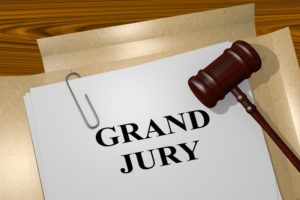The grand jury is an integral part of the criminal justice system due in large measure to the Fifth Amendment to the U.S. Constitution. The framers of the Constitution were concerned about the powers of the government to bring serious criminal charges against its citizens without having the proper evidence to support them. The constitutional provision requiring indictment by a grand jury before someone could be held to answer to what are not classified as felonies or serious criminal offenses was intended to shield people with a panel of grand jurors made up of common citizens.

Federal Grand Jury System
The Bill of Rights, which is the first 10 amendments to the Constitution, was originally only applicable to actions by the federal government and its agencies. Gradually, decisions by the Supreme Court made many of the rights and protections of the Bill of Rights applicable to conduct by state governments as well. However, the right to indictment by a grand jury in felony cases was not one of the rights extended to citizens of the states.
Anyone suspected of committing a violation of federal law must have his or her case presented to a grand jury. The evidence against the person must be presented by a prosecutor to a panel of grand jurors who vote to determine if the requisite number of jurors believe there is sufficient cause to believe the suspect committed the particular crime. If they believe he or she did, the grand jury votes to indict the person.
Grand Jury System in California
Each state is free to enact its own laws pertaining to the role of the grand jury in criminal cases. Some states follow the federal procedure, but other states allow for a modified use of the grand jury. California has two procedures prosecutors can follow in charging someone with commission of a felony: Grand jury indictment or prosecutor’s information and a preliminary hearing.
Grand juries exist in each county in the state. Depending on the population of the county, a grand jury is made up of 23, 19 or 11 members. All grand jury proceedings are held in secret and are not open to the public. Instead of being presided over by a judge as happens with a trial jury, grand jury proceedings are controlled by a prosecutor who decides what evidence to present. The suspect who is the target of a grand jury proceeding does not have the right to present evidence or participate.
California law imposes on prosecutors an obligation to present exculpatory evidence, which is evidence tending to prove the innocence of the suspect, when they are aware such evidence exists. Other than this restriction, prosecutors control the proceedings.
Preliminary Hearings in Lieu of Indictment
State law gives district attorneys an option to use instead of a grand jury indictment to charge someone with a felony. Prosecutors may request a preliminary hearing at which to present evidence to show probable cause to believe a particular felony has been committed and it was committed by the person being charged.
Preliminary hearings are held in open court and presided over by a judge. The attorney defending the person suspected of committing the crime has the right to cross-examine witnesses and present evidence favorable to the accused. At the end of the hearing, the judge can do one of three things:
- Dismiss the charges
- Find sufficient cause to try the accused on the charges
- Find the evidence failed to establish a felony and charge the person with a misdemeanor
If a judge finds cause to hold the accused for trial on a felony, prosecutors proceed by filing a document known as an information.
A district attorney may decide to seek an indictment instead of proceeding by way of an information in the following situations:
- High-profile cases drawing a great deal of attention by the media and the public.
- Where there are children or other witnesses the prosecutors do not want to subject to cross-examination until the trial.
- When the evidence is weak and a prosecutor does not want to risk presenting it at an open hearing.
California Criminal Defense Attorneys Can Help
Felony charges are some of the most serious criminal offenses with the most severe penalties. When choosing an attorney to represent you, you should choose someone with a proven record of success handling cases from indictment through trial.

